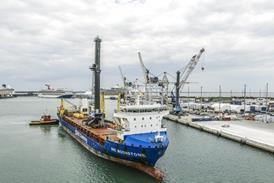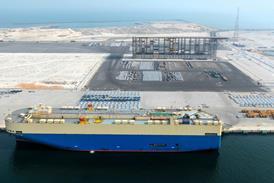When China sneezes, the world turns to its sick bed. Although China is now in the recovery position and regaining strength, the rest of the world is battening down the hatches.

There is a domino effect at play and, right now, Europe finds itself at the epicentre of the pandemic, with North and South America not far behind. Indeed, the number of cases in the USA has surged to at least 26,747, making it one of the worst hit countries in the world.
In the EU, a complete shut down of the bloc’s external borders to all non-essential travel, except truck deliveries, has been implemented, as HLPFI reported here.
Similarly, the USA and Canada have agreed to close the land border between the two countries. The border remains open for essential travel, which includes the transportation of goods, in order to not hamper trade and supply chains.
Dominik Keller of Switzerland-headquartered Fracht described the effects of the Covid-19 outbreak as some of “the worst the world economy has ever seen”. The freight forwarding specialist has offices across the world.
“Presently, we see that things will get worse with regard to the worldwide spread of the virus, thus limiting more and more the cargo movements. Of course, the safety and health of our own staff and everybody is priority number one,” he said.
Bottlenecks
The main bottleneck right now, according to Keller, is airfreight capacity. But the medium-term issue is liquidity.
“Every delay in payment – or even worse bankruptcy – will put other good companies in stress. Everybody will scale back their activities to a certain extend, and you will see exits from the sector,” he added.
Every delay in payment – or even worse bankruptcy – will put other good companies in stress. Everybody will scale back their activities to a certain extend, and you will see exits from the sector.
- Dominik Keller, Fracht
One freight forwarder said that general cargo volume in Europe is down 50 percent. While cargo is still moving, a challenge has been securing the required number of drivers, many of whom are being forced to self-isolate having entered countries where the pandemic is spreading.
Various ports and terminals have issued circulars indicating the current state of play. Wilhelmsen Ship Agency has introduced an interactive Covid-19 port restrictions map covering gateways around the world.
The map provides an overview of each port or country and their restrictions and is updated three times per day, listing locations with potential restrictions plus areas that have released updates within the last 24 hours.
![]()
Europe is in the throes of the Covid-19 crisis, and the situation will likely get worse before it gets better. Latin America is not far behind.
São Paulo, Brazil-headquartered Fox Brasil is already feeling the effects of the outbreak. The company’s project director, Murilo Caldana, said that effective March 18, all of its employees were working from home. Just one staff member from each department is available at its office for urgent enquiries and system issues.
“The novel coronavirus outbreak in Brazil started early March so we still cannot measure the impacts. Our government is taking necessary measures to make sure people will stay safe and cargo logistics will still keep going,” said Caldana on March 20.
Flattening the curve of contagion
Countries in Latin America and the Caribbean have been hit later than other regions from the pandemic and, according to the International Monetary Fund (IMF), have a chance to flatten the curve of contagion.
Efforts on multiple fronts to achieve this goal are under way. In addition to strengthening health policy responses, many countries in the region are taking measures of containment, including border closures, school closings, and other social distancing measures. These measures, together with the world economic slowdown and disruption in supply chains, the decline in commodity prices, the contraction in tourism, and the sharp tightening of global financial conditions are bringing activity to a halt in many Latin American countries—severely damaging economic prospects, said the IMF. It added: “For the region, the recovery we were expecting a few months ago will not happen and a 2020 with negative growth is not an unlikely scenario.”
According to Caldana: “Up to now, ports, airports, road and railways [in Brazil] are working but with people flow restrictions. Due to the global recession, we expect of course problems in short and medium term. FOX Brasil management learned with experiences worldwide and is basing its actions on successful models like Singapore and South Korea, focusing on projecting our employees, families, friends and community.”
The main challenges for its business are due to the shutdown of manufacturing plants worldwide, and subsequent associated financial risks, he added.
This the second in a series of article published by HLPFI on the impact of Covid-19 on the project logistics supply chain. You can read the first article here.
















